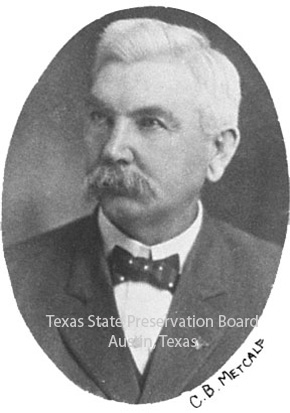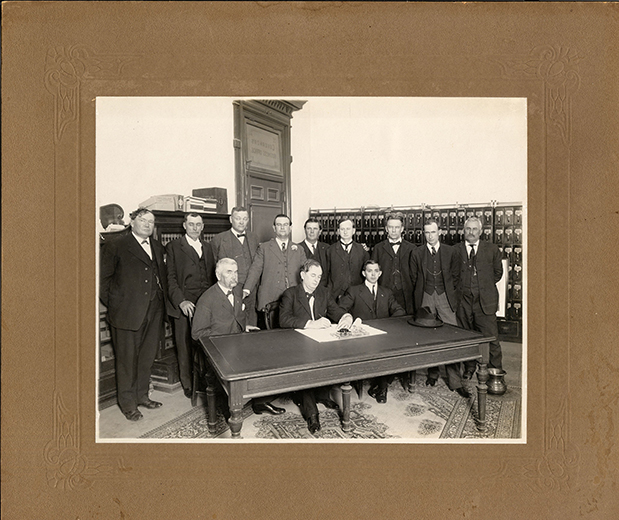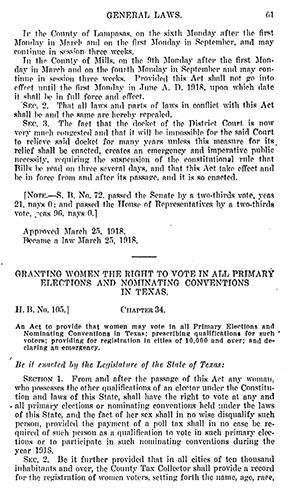A couple of weeks ago, Texans exercised their right to vote in the primary election. But they probably didn't know that they were voting in a landmark year: 2018 is the 100th anniversary of the first time Texas women were able to vote.
HB 105, 35-4 (1918) was the bill that made it possible, but it was not the Texas Legislature's first effort for women's suffrage. Beginning with the 1868-1869 Texas Constitutional Convention, a resolution was submitted recommending "every person, without distinction of sex" be entitled to vote. However, that provision was amended to read "every male person." In the 1875 Texas "Redeemer" Constitutional Convention, two women's suffrage resolutions were proposed but did not move forward.
In 1893, a statewide women's suffrage convention was held in Dallas, and the Texas Equal Rights Association (TERA) was chartered. At that point, the 23rd legislative session was almost over, but in the 24th Legislature (1895), Rep. A.C. Tompkins introduced HJR 29 to amend Section 2, Article 6 of the Texas Constitution, allowing all female persons not subject to other disqualification the right of suffrage. The resolution was reported to the Committee on Constitutional Amendments, but was never reported out. TERA ceased functioning in 1895.
In 1903 the Texas Equal Suffrage Association (TESA) was formed, and the legislature saw more women's suffrage bills. HJR 17, 30R (1907), by Rep. Jess Baker, was reported favorably out of the Committee on Constitutional Amendments; HJR 8, 32R (1911), also by Baker, received a second reading, and HJR 9, 33R (1913) by Rep. F.H. Burmeister was reported favorably with amendments—but still, women's suffrage bills stalled.
Opposition efforts certainly didn't aid the suffragists' cause: The Texas Association Opposed to Woman Suffrage was formed in 1916, and Gov. James Ferguson was vocally against women's suffrage. TESA worked toward the impeachment of Gov. Ferguson through the Women's Committee of Good Government, supported the war effort, and then, in the 4th called session of the 35th Legislature (1918), lobbied Gov. William P. Hobby to include "consideration of the subject of amending the election laws of Texas" among the 172 topics for the special session.

The called session began on February 26, 1918. On March 12, Rep. Charles B. Metcalfe, along with 14 co-authors, introduced HB 105. This bill took an incremental approach: rather than amending the constitution to allow women to vote in all elections, it provided for women to vote in all primary elections and nominating conventions in Texas. The bill passed the House (84-34) on March 15, and passed the Senate (18-4) on March 21.
On March 26, 1918, Gov. Hobby signed HB 105 in the presence of Rep. Metcalfe and other legislators, as well as leaders of the women's suffrage movement, including Minnie Cunningham, Nell Doom, Elizabeth Speer, and Jane McCallum. Rep. Metcalfe provided a fountain pen for the governor and presented it to Cunningham after the signing.

However, the bill did not go into effect for 90 days, and the next primary election was on July 27—this left less than three weeks for women to register to vote. TESA organized to assist women with registering, and more than 386,000 women registered in 17 days.
Of course, the push toward full women's voting rights was not complete. In its regular session, the 36th Legislature passed SJR 7 to amend the Constitution to allow equal suffrage, but the measure was defeated at the polls on May 24, 1919 (with 141,773 votes for and 166,893 votes against).
About a month later, on June 28, 1919, Texas became the ninth state and the first southern state to ratify the Nineteenth Amendment to the U.S. Constitution. In the 36th Legislature's second called session, legislators passed HJR 1, "Ratifying an amendment to the Constitution of the United States which provides, in substance, that the right of citizens of the United States to vote shall not be denied or abridged by the United States or by any state on account of sex."
Visit the LRL to see our "desk" of Rep. Metcalfe as it might have appeared in 1918 when he worked toward the passage of the first women's suffrage bill signed into law in Texas.
Images from top: HB 105, 35-4, as it appears in the session law; Rep. Charles B. Metcalfe, courtesy of the Texas State Preservation Board; Gov. William P. Hobby (seated middle) signing HB 105 in the presence of Rep. Metcalfe (seated to the governor's right) and other legislators, courtesy of a private collection via the West Texas Collection, Angelo State University, San Angelo, TX.
Cover image: San Antonio Express. (San Antonio, Tex.), Vol. 53, No. 86, Ed. 1 Wednesday, March 27, 1918, newspaper, March 27, 1918; San Antonio, Texas. (texashistory.unt.edu/ark:/67531/metapth434692/m1/1/?q=suffrage: accessed March 15, 2018), University of North Texas Libraries, The Portal to Texas History, texashistory.unt.edu; crediting Abilene Library Consortium.


